#Portapique
Explore tagged Tumblr posts
Text
"Unveiling the Hidden Struggle: Maine Shooting Survivor Reveals Heart-Wrenching Tale of 'Survivor's Guilt'"
The recent mass shooting in Maine has triggered painful memories of the tragedy that occurred in Nova Scotia in April 2020. This news has deeply affected Mallory Colpitts, even though she is almost 1,000 kilometers away from the border. Colpitts, a survivor of the Nova Scotia mass shooting, recalls hiding in her Portapique home for hours while 22 people were killed by a gunman. The trauma from…
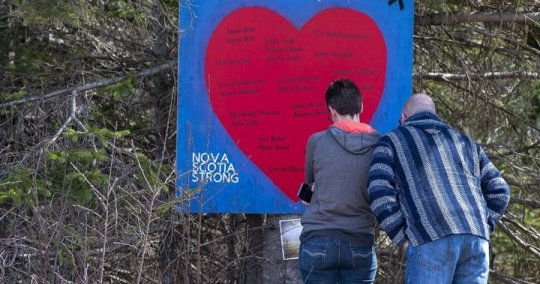
View On WordPress
0 notes
Text
"Unveiling the Hidden Struggle: Maine Shooting Survivor Reveals Heart-Wrenching Tale of 'Survivor's Guilt'"
The recent mass shooting in Maine has triggered painful memories of the tragedy that occurred in Nova Scotia in April 2020. This news has deeply affected Mallory Colpitts, even though she is almost 1,000 kilometers away from the border. Colpitts, a survivor of the Nova Scotia mass shooting, recalls hiding in her Portapique home for hours while 22 people were killed by a gunman. The trauma from…
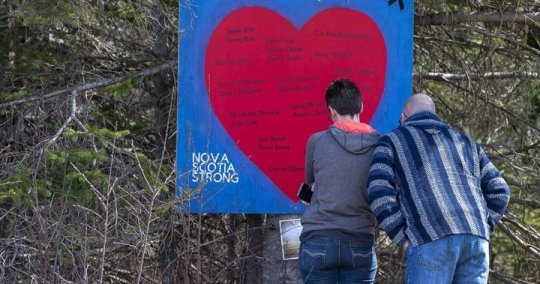
View On WordPress
0 notes
Text
Notes taken by Mounties in the years leading up to the Nova Scotia mass shooting were "incomplete, illegible, missing" and deficient overall — a problem the authors of a recently released report on the 2020 tragedy say needs to be addressed.
In fact, the Mass Casualty Commission's final report says the justice system should "exercise caution in drawing inferences from an absence of RCMP members' notes or omissions in notes taken."
"Courts, tribunals and the public need to be aware that simply because something is not reflected in a police officer's notes does not mean it did not happen," says the report.
Note-taking is one of the fundamentals of policing. RCMP officers are expected to follow a national policy on keeping notes from crime scenes or during undercover investigations.
"Note-taking is always an issue," former RCMP commissioner Brenda Lucki acknowledged during the Mass Casualty Commission hearings.
"We stress that importance. And [officers are] provided feedback on good notes, poor notes. And then they get so busy that it's one of the first things, for some reason, in some cases, to drop by the wayside."
The inquiry into the 2020 mass shooting — which left 22 people dead, including a pregnant woman — discovered a pattern of problems in the work of the RCMP officers who interacted with the gunman in the years leading up to the mass shooting.
"The commission scheduled several days of testimony, in part because police officers' notes were incomplete, illegible, missing, or simply did not articulate their observations, decisions, and actions as required by national policy," the commissioners wrote in their final report, released last month in Truro, N.S.
Brenda Forbes, a former neighbour of the gunman, Gabriel Wortman, testified that she reported to police that Wortman had choked his partner Lisa Banfield near their Portapique cottage. She testified she was "concerned that the perpetrator was going to kill her."
Three officers responded at various times. Only one, now-retired constable Troy Maxwell, kept his notes. While they contained little information about his conversation with Forbes, he testified that the complaint was about the perpetrator driving a decommissioned police car too fast around the neighbourhood and scaring people.
The report said no evidence suggests Wortman started collecting decommissioned police cars until 2019 — about six years after Forbes's complaint.
"It appears that the passage of time, the scourge of post-traumatic stress disorder affecting both Ms. Forbes and Maxwell as witnesses, and inadequate record-keeping conspire to prevent us from knowing exactly what Ms. Forbes said and what Maxwell heard," said the report.
"We find that the lack of clarity about [Maxwell's] policing role that day and actions he took in response to the report demonstrate a systemic RCMP failure of investigative training, policies and practices."
The commissioners also raised concerns about the notes kept by Const. Greg Wiley, the RCMP, visited the gunman about 16 times in the years before the mass shooting. Wiley testified that he considered Wortman "a community contact."
"Wiley was unable to produce any notes concerning his interactions with the perpetrator, most notably after he was called to assist the Halifax Regional Police with a firearms complaint in 2010," the report said.
Cordell Poirier, a now-retired Halifax Regional Police officer, said in a commission interview that Wiley "told me that he was a good friend" of the gunman's and would try to find out if Wortman had weapons at his Portapique cottage.
Wiley said he had no memory of dealing with Poirier. "The inadequacy of notes and the failure to retain notes, in this case, is an example of the broader inadequacies of the RCMP policies and practices concerning note-taking," wrote the commissioners.
In a third matter, notes couldn't be produced, which may have shed light on how police responded to a 2011 bulletin which warned that Wortman had firearms and had expressed a desire to "kill a cop." It also polices to use "extreme caution" when dealing with him.
A lawyer for the RCMP argued that the commissioners couldn't make a factual finding that a warrant to search the perpetrator's properties should have been pursued following the bulletin.
"However, we don't need to make such factual findings to determine that record-keeping practices and information sharing among Nova Scotia police agencies were deficient and that the police should have exercised their discretion to conduct further investigations and ensure complainants' safety," the commissioners wrote in their final report.
"The quality of front-line members' note-taking practices and the quality of supervision of note-taking practices are both important markers of the extent to which a police agency is committed to effective everyday policing."
The RCMP has committed to reading the report and disclosing the recommendations it intends to pursue. The MCC report is far from the first time Mounties' note-taking practices have come in for criticism.
The Civilian Review and Complaints Commission for the RCMP has pointed to shortcomings in note-taking practices in multiple reports, including its review of how police responded to the shooting death of Colten Boushie, a Cree man who was killed by Gerald Stanley on his farm in August 2019.
A 2014 internal audit also called out issues in note-taking and note-keeping. Those auditors reviewed a sample of RCMP notebooks from across the country with missing pages, improper handwritten corrections and no indication that supervising officers had routinely inspected them, as required.
That report, almost a decade old, recommended the RCMP toughen and enforce its rules for notebooks. The Mass Casualty Commission has delivered the same message that the RCMP "implement training and supervisory strategies to ensure that all members take complete, accurate and comprehensive notes."
The problem is not limited to the RCMP, said Ian Scott, five years served as director of Ontario's Special Investigations Unit, investigating incidents involving officers and often coming face-to-face with questionable record-keeping.
"Police officers are, to some degree, professional witnesses. And they have to recite events that have often been months, if not years, in the past," he said.
"I as far as to say there's a common law duty for police officers to take notes. They're just so important to the whole justice system." Defence lawyer Eric Neubauer said he sees problems with police note-taking in court "every day."
"Proper note-taking is so important because it impacts every facet of the criminal justice system, every component," he said. "From police to the Crown to the defence to the courts, all rely on excellent note-taking, and all are collectively disappointed when we see the stubbornly persistent problem of poor note-taking continue."
In 2010, for example, a retired RCMP officer in Manitoba burned all of his notebooks — covering 32 years of police work — including notes that may have been relevant to a careless-driving case. A Crown prosecutor dropped the case of the charge after learning about the destroyed material.
Even the Supreme Court weighed in on the issue after two Ontario Provincial Police shot and killed two people. In both cases, the officers involved were instructed by their superiors to not take any notes about the incident until they spoke to a lawyer.
"I conclude that the police must write accurate, detailed and complete notes as soon as possible after the investigation," Justice Michael Moldaver wrote for the majority.
"Allowing police officers to consult with a lawyer before writing their notes is the antithesis of the transparency the legislative scheme is intended to promote."
Neubauer said there's no excuse for officers taking shoddy notes. "This is a confusing problem. Why still are seeing it persist, given all we know about it, given how many commissions and other courts have talked about its great importance?" he said.
"It is curious, to say the least, why we are still facing the problem of poor note-taking," Scott said one of the only ways to change the culture of note-keeping is to institute a better culture.
"But think the answer is a combination of more assiduous supervision and consequences for not having decent notes, maybe affecting their ability to be promoted to a higher rank."
Greg Brown, a former officer with the Ottawa Police Service who now teaches at Carleton University, said the longstanding issues reinforce the need for body-worn cameras.
"That really mitigates against bad note-keeping. If you have three or four officers at a scene, it's captured from multiple angles is good. I mean, what better evidence is there of what exactly transpired?" he said.
"It, tone, intonation, body language, pauses … all the nonverbal communication we rely on." The RCMP plans to roll out 10,000 and 15,000 body-worn cameras to frontline officers later this year and into 2024.
Neubauer said body-worn cameras will raise questions about data collection, but new transcription technology could help clean up officers' notes.
"I think that's a place where improvements can be made and maybe the future of note-taking, as long as those procedural safeguards are in place," he said.
Another possible solution: is naming and shaming. "I think one thing that the courts can do to address this problem is to continue to shed light on this problem in the same way that the commission did," said Neubauer.
"And continue to be critical instances where judges note that a police officer's note-taking practices have fallen below par."
0 notes
Text
rely on the things you love for strength and comfort.
The world is rotting. Don’t punish yourself for squeezing your sanity from things that will not hurt you.
I find myself, when I am in pain, wrapping myself up in the same things I loved as a child. They have been a constant in the turbulence of life.
Those comics and cartoons that fed my juvenile imagination, that gave me something to fall back on, that taught me how to tell a story; they come back to me with every tragedy.
For a long time I fought it. I am distracting myself from what matters with fantasy and fiction. But with age came a better understanding. I am repairing myself with the things I am built from.
I am borrowing from better times to bandage the wounds; healing by applying the familiar to the uncanny.
Do not harm others or yourself. Stay healthy and cherish what you have. Don’t argue, if you can help it, over the internet or in your home. Just return to the comfort of things that love you as much as you love them, and find some semblance of security. Look out for the future.
#just please stay calm and love each other#nova scotia strong#portapique#covidー19#covid 19#coronavirus#sorry for the following insensitive fandom tags#but I want to tag the things that I draw comfort from#digimon#x-men#digimon 2020#digimon psi#90s cartoons#00s cartoons#ratchet and clank#dark cloud#ps2#cardcaptor sakura
46 notes
·
View notes
Text
Nova Scotia Shooting Rampage - 10 Shot, Suspect Dead
Nova Scotia Shooting Rampage – 10 Shot, Suspect Dead
A mass shooting across Nova Scotia left at least 10 dead, including an officer with the Royal Canadian Mounted Police. The shooter was disguised as a policeman and had a fake police car. The suspect was killed after an intense manhunt on Sunday afternoon. The manhunt lasted about 12 hours.
The rampage began late Saturday at a residence in Portapique, Nova Scotia, a town with a population of…
View On WordPress
#active shooter#Gabriel Wortman#Heidi Stevenson#Nova Scotia#police chase#Portapique#RCMP#Royal Canadian Mounted Police#Uncle Sam&039;s Misguided Children
6 notes
·
View notes
Text

I don’t normally post stuff like this but this has really shook my province.
I’m from Nova Scotia and if anyone in Canada would of seen the news about the horrible mass shooting spree that has occurred over the weekend.
It was a senseless act of violence by one man who has torn not only families apart but this province. Many have lost loved ones, friends, colleagues and we will mourn them all together.
I know as Nova Scotioners we will come together in this tome of sorrow and support those who need it most. We will get through this and I send all my love and prayers to the people affected by this horrific tragedy.
Pray for Nova Scotia💙🤍💙🤍
4 notes
·
View notes
Text
.
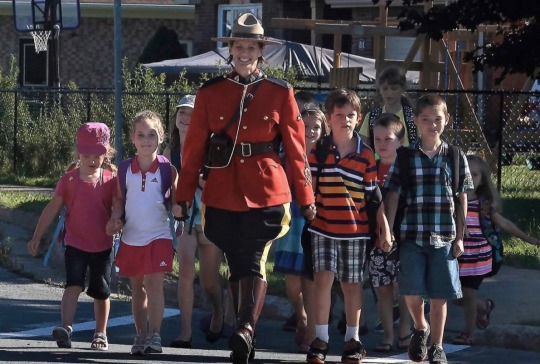
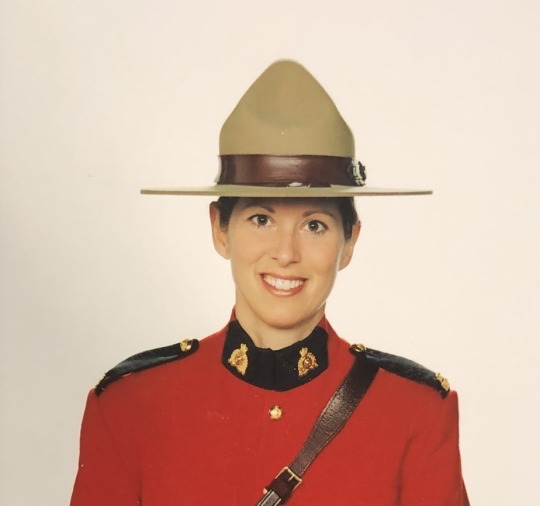
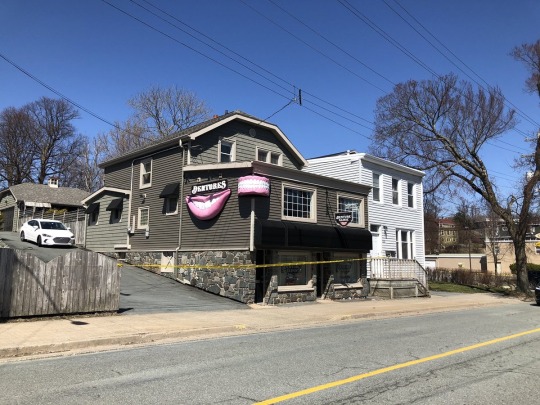
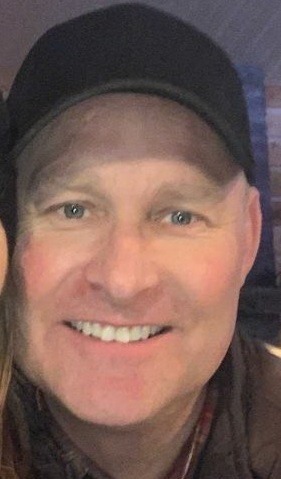
TRAGÉDIE NOUVELLE ÉCOSSE
Un total de 16 victimes ont été tuées par le tireur fou, Gabriel Wortman 51 ans, à proximité du petit village de Portapique en Nouvelle Écosse. L’homme était un denturologue de profession, financièrement à l’aise avec deux bureaux pour ses services de dentisterie et plusieurs propriétés résidentielles.
Les policiers croient qu’il y aurait d’autres victimes qui seront découvertes au cours des prochaines heures.
https://www.ledevoir.com/societe/577315/un-tireur-en-nouvelle-ecosse-a-ete-arrete-apres-avoir-fait-des-victimes
2 notes
·
View notes
Text
Justin Trudeau while you’re off playing mock war games the victim’s families in Portapique are looking for answers as to why the RCMP completely failed them?
These senior RCMP scumbags need to testify at the inquiry and be exposed for the slimy pieces of shit they really are!
Guessing they’ve had ample time to unite and formulate a grandiose lie explaining their failures at all levels.
1 note
·
View note
Photo
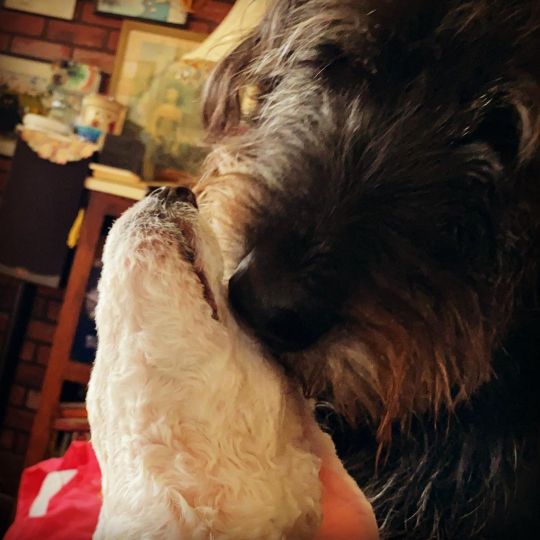
Spent a quiet day at home on an anniversary no one wanted to happen #portapique #nsstrong #halifax #novascotia #hfxdogsquad #senseless #dogkisserinternationalheadquarters (at Dogkisser International Headquarters) https://www.instagram.com/p/CN0zdqFHZ6Q/?igshid=2ghnpyae812
0 notes
Photo

Our heartfelt condolences to the people affected by this tragedy in Nova Scotia. #Portapique #NovaScotiaStrong #CanadaStrong (at Portapique, Nova Scotia) https://www.instagram.com/p/B_ND6ynhKsR/?igshid=ulx1mydwpz65
0 notes
Text
everyone, go give someone you love a hug, if you are in an argument with someone you love, give them a hug. You never know, someone could be gone in a few minutes Especially in nova scotia
1 note
·
View note
Text
1 note
·
View note
Photo
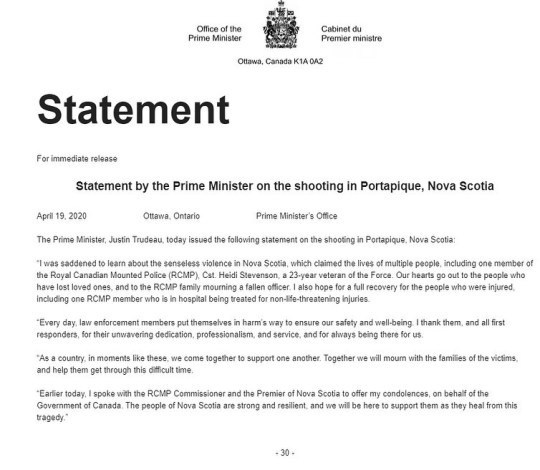
“Today is a devastating day for Nova Scotia and it will remain etched in the minds of many, for years to come”: Statement from RCMP on the death of Constable Heidi Stevenson #Portapique #NovaScotia BREAKING: RCMP Commissioner Brenda Lucki tells CBC's Ian Hanomansing the death toll in the Nova Scotia shooting rampage is currently at 13, not including the suspect. Investigators say they could still find more victims. Police says RCMP Constable Heidi Stevenson was killed in the Portapique shooting this morning. She was a 23-year veteran of the force and mother of two. Another officer is receiving treatment for non-life-threatening injuries. God bless Nova Scotia https://www.instagram.com/p/B_Lu9qchoUg/?igshid=166lz2xsd76h8
0 notes
Photo




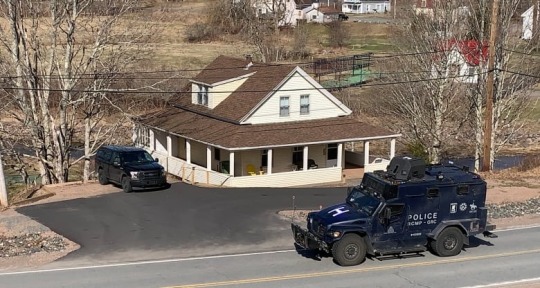
LA TRAGÉDIE DE LA NOUVELLE-ÉCOSSE La Nouvelle-Écosse est une province magnifique. Les paysages sont plus beaux encore que la Gaspésie, que j’adore! Malheureusement, le paradis de la Nouvelle-Écosse est devenu enfer... Le « Diable » y a fait son miracle! Guy Fournier connait bien lui aussi, comme moi, la Nouvelle-Écosse et son texte dans le Journal de Montréal (lundi 27 avril 2020) aurait pu être écrit par moi tellement je partage entièrement sa vision de la description. https://www.journaldemontreal.com/2020/04/23/lhorrible-tueur-de-portapique#cxrecs_s
0 notes